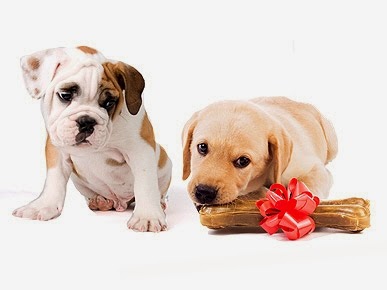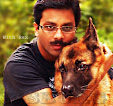Do Dogs Get Jealous: Jealousy in Dogs is Supported By Scientific Proof
Dog Jealousy - Dog Jealous of New Dog and other dog and Dog Jealous of Baby
Often times people ask me "do dogs get jealous" and at time they even complain that about dog jealous of baby or dog jealous of other dog and so on...
Is your dog jealous of baby or a new dog or does he exhibit jealousy when you pay your lavish attention to pets? If so, then it's quite natural - jealousy in dogs is deeply hardwired in their psychology. Anyone who is an owner of several dogs knows that dogs get jealous at certain things and in certain situations, and is an obvious part of their emotions. Even Charles Dawin (English naturalist, geologist and contributor to evolutionary theory) observed that dogs really exhibit jealousy.
However, dog jealousy has now been proven through a study on canine behavior. The experiment on 36 dogs was carried out by scientists at the University of California, led by psychology professor Christine Harris - the first scientific confirmation of dog jealousy. 36 dogs had been put into an experimentation to monitor their reactions when they were ignored by their owners.Professor Harris and the team gave the dog owners three distinctive activities: Either reading book aloud OR paying lavish attention to an unknown object (a Halloween bucket) OR petting and talking to a toy dog that could electronically moved and barked. Lead professor and psychologist Christine Harris observed that the dogs did not exhibit much responsiveness to their owners act of reading books aloud, while showed irritation to their owners on loving the toy dogs. According to Harris even 40% of the dogs that were put into experimentation even showed jealous behavior, finding their owners talking to the plastic Halloween pumpkin. The finding related to jealousy in dogs suggested that dog jealousy is one of the basic instincts in them to respond irritatingly on the feeling of a rival being paid more attention. Harris opined that this is something that might help psychologists understand human jealousy more efficiently. Harris told the Washington Post: “It suggests to me that some of our ideas about the nature of jealousy, like that it requires complex cognition, are incorrect”. However, other scientists have stated that the dogs in the study might not been jealous, but they were probably showing natural responsiveness when their owners handled a creature much like them.
However, studying jealousy in dogs is a very new domain in the field of dog behavior science and needs to ascertain the probable reasons of a dog jealous of new dog, a dog jealous of other dog or any other pet in the society and a dog jealous of baby. Lead professor Harris said that the findings of their studies challenge the ideas that "jealousy is a social construction of human beings", and showed that animals, besides human beings exhibit strong distress on something as a seeming rival gets more attention of their loved ones. The dogs, as a distress-elicited behavior, exhibits reaction and tend to break up the connection between their loved ones (owners or other human pack members) and a seeming rival. In the study almost one/third of the dogs tested
Just under a third of the dogs attempted to get between their owner and the toy dogs showing all-out effort to win back the attention of their beloved masters. Around a quarter quarter of them who were tested tried to snap at the other dog - toy that could artificially move and bark, and finally one of the dogs showed similar behavior when their owners paid attention on the bucket and book.
This study published in the journal Plos One, and it suggest that dogs really do get jealous. However, this isn't something that dog lovers do not know, but something that had no scientific proof as a support - probably the first scientific confirmation of the behaviour - jealousy in dogs.
However, according to canine behaviorist Ceasar Milan "dogs are not jealous". While addressing dog jealousy within a pack he said that dogs are not jealous.
My personal view: I think dogs have an innate tendency to claim his/ her own things, of which his owner's attention is one worth mentioning. Among the other things that a dog claims are territory, toy, and position in the pack, and while claiming but not winning a clash occurs, which is viewed by us as a result of jealousy and we call the subject a "Jealous dog". A dog jealous of baby or a new dog is result of claiming the position by a dog that used to get full attention and importance, but is devoid of those things now.
Hope you will find this this video interesting
Often times people ask me "do dogs get jealous" and at time they even complain that about dog jealous of baby or dog jealous of other dog and so on...
Is your dog jealous of baby or a new dog or does he exhibit jealousy when you pay your lavish attention to pets? If so, then it's quite natural - jealousy in dogs is deeply hardwired in their psychology. Anyone who is an owner of several dogs knows that dogs get jealous at certain things and in certain situations, and is an obvious part of their emotions. Even Charles Dawin (English naturalist, geologist and contributor to evolutionary theory) observed that dogs really exhibit jealousy.
However, dog jealousy has now been proven through a study on canine behavior. The experiment on 36 dogs was carried out by scientists at the University of California, led by psychology professor Christine Harris - the first scientific confirmation of dog jealousy. 36 dogs had been put into an experimentation to monitor their reactions when they were ignored by their owners.Professor Harris and the team gave the dog owners three distinctive activities: Either reading book aloud OR paying lavish attention to an unknown object (a Halloween bucket) OR petting and talking to a toy dog that could electronically moved and barked. Lead professor and psychologist Christine Harris observed that the dogs did not exhibit much responsiveness to their owners act of reading books aloud, while showed irritation to their owners on loving the toy dogs. According to Harris even 40% of the dogs that were put into experimentation even showed jealous behavior, finding their owners talking to the plastic Halloween pumpkin. The finding related to jealousy in dogs suggested that dog jealousy is one of the basic instincts in them to respond irritatingly on the feeling of a rival being paid more attention. Harris opined that this is something that might help psychologists understand human jealousy more efficiently. Harris told the Washington Post: “It suggests to me that some of our ideas about the nature of jealousy, like that it requires complex cognition, are incorrect”. However, other scientists have stated that the dogs in the study might not been jealous, but they were probably showing natural responsiveness when their owners handled a creature much like them.
However, studying jealousy in dogs is a very new domain in the field of dog behavior science and needs to ascertain the probable reasons of a dog jealous of new dog, a dog jealous of other dog or any other pet in the society and a dog jealous of baby. Lead professor Harris said that the findings of their studies challenge the ideas that "jealousy is a social construction of human beings", and showed that animals, besides human beings exhibit strong distress on something as a seeming rival gets more attention of their loved ones. The dogs, as a distress-elicited behavior, exhibits reaction and tend to break up the connection between their loved ones (owners or other human pack members) and a seeming rival. In the study almost one/third of the dogs tested
Just under a third of the dogs attempted to get between their owner and the toy dogs showing all-out effort to win back the attention of their beloved masters. Around a quarter quarter of them who were tested tried to snap at the other dog - toy that could artificially move and bark, and finally one of the dogs showed similar behavior when their owners paid attention on the bucket and book.
This study published in the journal Plos One, and it suggest that dogs really do get jealous. However, this isn't something that dog lovers do not know, but something that had no scientific proof as a support - probably the first scientific confirmation of the behaviour - jealousy in dogs.
However, according to canine behaviorist Ceasar Milan "dogs are not jealous". While addressing dog jealousy within a pack he said that dogs are not jealous.
My personal view: I think dogs have an innate tendency to claim his/ her own things, of which his owner's attention is one worth mentioning. Among the other things that a dog claims are territory, toy, and position in the pack, and while claiming but not winning a clash occurs, which is viewed by us as a result of jealousy and we call the subject a "Jealous dog". A dog jealous of baby or a new dog is result of claiming the position by a dog that used to get full attention and importance, but is devoid of those things now.


























0 comments:
Post a Comment